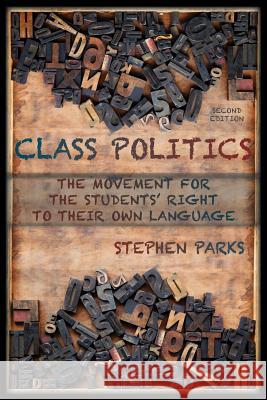Class Politics: The Movement for the Students' Right to Their Own Language (2e) » książka
Class Politics: The Movement for the Students' Right to Their Own Language (2e)
ISBN-13: 9781602354180 / Angielski / Miękka / 2013 / 364 str.
"Stephen Parks restores politics to the history of Composition Studies." -Richard Ohmann CLASS POLITICS THE MOVEMENT FOR THE STUDENTS' RIGHT TO THEIR OWN LANGUAGE (Second Edition) is a response to histories of Composition Studies that focused on scholarly articles and university programs as the generative source for the field. Such histories, particularly in the 1980s and 1990s divorced the field from activist politics-washing out such work in the name of disciplinary identity. Class Politics shows the importance of political mass movements in the formation of Composition Studies-particularly Civil Rights and Black Power. CLASS POLITICS also critiques how the field appropriates these movements. The book traces a pathway from social movement, to progressive academic groups, to their work in professional organizations, to the formation of the Students' Right to Their Own Language. Stephen Parks then shows how the SRTOL was attacked and politically neutralized by conservative forces in the 1980s and 1990s, arguing for a return to politics to reanimate it's importance-and the importance of politics in the field. STEPHEN PARKS is an Associate Professor of Writing and Rhetoric at Syracuse University's Writing Program, where he also serves as Director of Graduate Studies. In addition to CLASS POLITICS: THE MOVEMENT FOR A STUDENTS' RIGHT TO THEIR OWN LANGUAGE, he is the author of GRAVYLAND: WRITING BEYOND THE CURRICULUM IN THE CITY OF BROTHERLY LOVE (Syracuse University Press, 2010). He has also published in College English, College Composition and Communication, Reflections (of which he is the former editor), and Community Literacy Journal.
"Stephen Parks restores politics to the history of Composition Studies." -Richard Ohmann | CLASS POLITICS THE MOVEMENT FOR THE STUDENTS RIGHT TO THEIR OWN LANGUAGE (Second Edition) is a response to histories of Composition Studies that focused on scholarly articles and university programs as the generative source for the field. Such histories, particularly in the 1980s and 1990s divorced the field from activist politics-washing out such work in the name of disciplinary identity. Class Politics shows the importance of political mass movements in the formation of Composition Studies-particularly Civil Rights and Black Power. CLASS POLITICS also critiques how the field appropriates these movements. The book traces a pathway from social movement, to progressive academic groups, to their work in professional organizations, to the formation of the Students Right to Their Own Language. Stephen Parks then shows how the SRTOL was attacked and politically neutralized by conservative forces in the 1980s and 1990s, arguing for a return to politics to reanimate its importance-and the importance of politics in the field. | STEPHEN PARKS is an Associate Professor of Writing and Rhetoric at Syracuse Universitys Writing Program, where he also serves as Director of Graduate Studies. In addition to CLASS POLITICS: THE MOVEMENT FOR A STUDENTS RIGHT TO THEIR OWN LANGUAGE, he is the author of GRAVYLAND: WRITING BEYOND THE CURRICULUM IN THE CITY OF BROTHERLY LOVE (Syracuse University Press, 2010). He has also published in College English, College Composition and Communication, Reflections (of which he is the former editor), and Community Literacy Journal.











